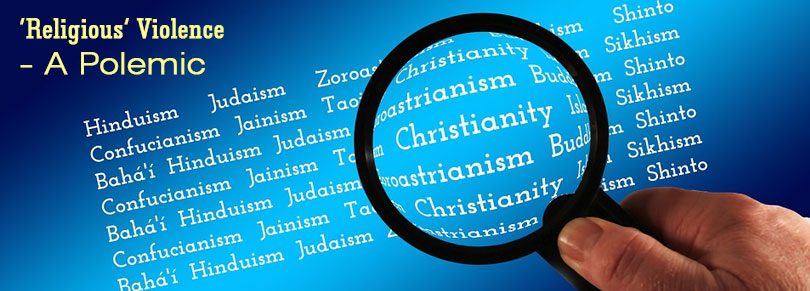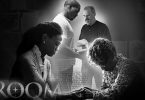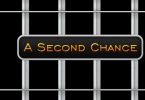Vinoth Ramachandra in his book Subverting Global Myths refers to Professor Jessica Stern who, after interviewing many violent activists, claimed to have noticed one thing that distinguished religious terrorists from other people – ‘they know with absolute certainty that they are doing good and that they seem more confident and less susceptible to self-doubt than most other people’.
He challenges it by asking ‘why is such absolute certainty confined to religious militants?’ and counters it with Wink’s ‘Myth of Redemptive Violence’ (that violence saves, that war brings peace, that might makes right) that is present in many societies, and is not tied to religious worldviews. Some of the most terrible violence of the twentieth century was inflicted by officially atheistic regimes, such as in the Soviet Union, Mao’s China and North Korea.
Even today, most dictatorial regimes are not Islamic or ‘religious’ in any traditional sense. Whether in North Korea, Burma or Zimbabwe, Buddhist and Christian dissidents have been deprived of civic rights, imprisoned or killed. Moreover, he points out, it is not devout Muslims who have been developing and amassing weapons of mass destruction but “enlightened” secular states. Hinnells and King in Religion and Violence in South Asia challenge the commonly held view that ‘religion’ has a particular association with violence.
Consider, they say, a few salient facts and statistics about the contemporary world in which we live:
- 62 to 65 percent of the world’s military budget is spent by five ‘secular’ states –USA, UK, France, Japan and China.
- Statistics related to the sphere of ‘secular’ activity of rapidly expanding global economy show that more than 20,000 people die every day because of extreme poverty (and these deaths are preventable), while others live in conditions of unparalleled affluence. This is perhaps the most scandalous example of ongoing systemic violence in human history. Yet we hardly ever hear about it.
The statistics of military spending of the ‘secular’ states and the expansion of the global economy that is violently destroying thousands of lives every day, forces us to wonder why the recurring issue of mass-mobilized forms of violence is often seen as a problem specifically associated with ‘religion.
King suggests that by focusing one’s attention upon the apparently intolerant, dogmatic and socially disharmonious aspects of identifiable entities known as ‘the religions’, our attention is distracted from asking deeper structural questions about violence in modern, ‘everyday’ life and about our involvement in such violence. The debate about religious violence seemingly insulates the institutional forms, organisations and ideologies that govern modern ‘secular’ life from critical appraisal and accountability.
Do differences in faith necessarily lead to violent conflicts?
Martha Nussbaum in The Clash Within proposes that lack of education about religions in post independence India, marginalization of religion that began after the partition, led to religion being equated with extremism and played into the hands of religious extremists who monopolised this important domain of human life. She quotes Gurucharan Das’ words, ‘our secularism has failed to stem the tide of intolerance because most secularists do not value the religious life. In well meaning efforts to limit religion to the private life they behave as though all religious people are superstitious and stupid.’ Does stressing the differences between faiths necessarily lead to violent conflict?
Pointing to the Shia-Suni conflict, Ian Talbot questions some of the popular beliefs about religious violence by asking, “If it is rival concepts of God or salvation that always occasion violent conflict, why have the most bitter wars in history (and right up to the present day) been waged between coreligionists and not between adherents of rival religious communities?” Violent conflict between religious communities is often provoked by insidious stereotyping and caricaturizing of the other’s practices, beliefs and aims – ‘polygamous’, ‘no- birth control’, ‘terrorists’, etc about Muslims; ‘Illiterate’, ‘bastards’, ‘non- meritorious’, ‘govt’s children’, etc about Dalits and Adivasis.
Stereotyping is compounded, ironically, by those liberal politicians and local community leaders who gloss over deep-seated differences in the mistaken notion that this is what tolerance demands. Further to this context, Anantanand Rambachan, a renowned scholar in the Hindu faith, in his keynote address at the ‘Hindu-Christian Consultation’, held at Varanasi in October 1997 points out that communities where differences are minimized or downplayed, are more likely to suffer violence and upheavals in times of tension.
Communities, on the other hand, which engage openly with each other and honestly acknowledge differences are less likely to explode in times of conflict. Martha Nussbaum contests that there appears to be two clashes – the first is a clash between two different sorts of democratic citizens, one who do not fear difference, who seek peaceful relations with people from other religions and ways of life, and who see democratic institutions as strong enough to provide the groundwork for a future of mutual respect.
The other are those who fear religious and ethnic differences as a deep threat to order and safety, who have learned to hate people who insist on living in a way that sets them off from the majority, and whose anxious desire for control leads them to legitimize violence. The second ‘clash’ is a clash inside the person, between the forces of fear and reactive domination and the forces that lead to compassion and respect – a ‘clash’ that must be mediated through effective education and a decent public culture.
So, how do you and I respond to these clashes that we are in the midst of?
Passivity and selfish reactive responses do not suffice. We need to collectively engage in strengthening our democratic institutions so that a firm foundation is built for a future of mutual respect between people. The democratic institutions, including civil society and religious institutions must address the reality of ‘deep seated fear of domination, disrespect and oppression’ that is brewing among various sections of our society. There is a need for mediation between the forces of fear and forces of mutual trust and respect. Religious tolerance does not mean an attitude of denial of the others religious traditions and practices nor ignorance about them.
Therefore, we need to introspect and consciously avoid contributing to minimizing or downplaying of existing differences; rather we must openly engage with each other and honestly acknowledge differences without fear. One of the most promising possibilities is through effective education about religions. We cannot afford to marginalise it any further in order to redeem religions from being abused by people with narrow political and economic interests. As the purpose of education is not only skill training and wealth creation, but also for developing sustainable relationship with fellow beings and the environment for coexistence, effective education that promotes these is the need of the hour.
Alongside in our homes and neighbourhoods, we should promote education about the religions among the children and young people in order to facilitate them to build bridges with each other. As the ‘Myth of redemptive violence’ perpetuates violence under the guise of ‘larger interest of the people’ or ‘for the greater common good’, we must ask much deeper structural questions about violence in modern life and move to action. In Walter Wink’s words let us meet injustice with ‘militant non- violent confrontation’ or ‘Jesus’ Third Way’ as he calls it, which is:
Seize the moral initiative
Find a creative alternative to violence
Assert your own humanity and dignity as a person
Meet force with ridicule or humor
Break the cycle of humiliation
Refuse to submit or to accept the inferior position
Expose the injustice of the system
Take control of the power dynamic
Shame the oppressor into repentance
Stand your ground
Make the Powers make decisions for which they are not prepared
Recognize your own power
Be willing to suffer rather than retaliate
Force the oppressor to see you in a new light
Deprive the oppressor of a situation where a show of force is effective
Be willing to undergo the penalty of breaking unjust laws
Die to fear of the old order and its rules
Seek the oppressor’s transformation
 Chitra & Rabbi Jayakaran are social workers heading Peacemakers, an NGO engaged in finding radical solutions for conflict and violence and sustaining justice and peace. They are also family life educators and counsellors. Chitra & Rabbi Jayakaran are social workers heading Peacemakers, an NGO engaged in finding radical solutions for conflict and violence and sustaining justice and peace. They are also family life educators and counsellors. |






Leave a Comment